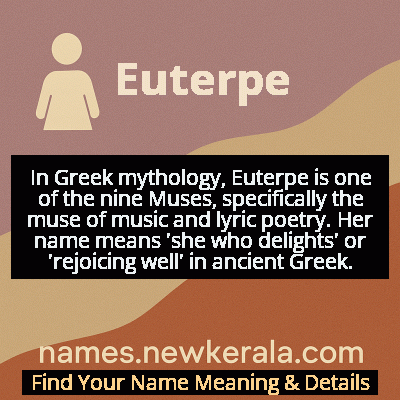Euterpe Name Meaning & Details
Origin, Popularity, Numerology Analysis & Name Meaning of Euterpe
Discover the origin, meaning, and cultural significance of the name EUTERPE. Delve into its historical roots and explore the lasting impact it has had on communities and traditions.
Name
Euterpe
Gender
Female
Origin
Greek
Lucky Number
9
Meaning of the Name - Euterpe
In Greek mythology, Euterpe is one of the nine Muses, specifically the muse of music and lyric poetry. Her name means 'she who delights' or 'rejoicing well' in ancient Greek.
Euterpe - Complete Numerology Analysis
Your Numerology Number
Based on Pythagorean Numerology System
Ruling Planet
Mars
Positive Nature
Generous, passionate, energetic, and humanitarian.
Negative Traits
Impulsive, impatient, moody, and can be overly emotional.
Lucky Colours
Red, maroon, scarlet.
Lucky Days
Tuesday.
Lucky Stones
Red coral, garnet.
Harmony Numbers
1, 2, 3, 6.
Best Suited Professions
Military, sports, philanthropy, leadership roles.
What People Like About You
Courage, energy, leadership, generosity.
Famous People Named Euterpe
Euterpe (Mythological)
Greek Muse
Presided over music, song, and lyric poetry in Greek mythology
Euterpe (Astronomical)
Asteroid
Discovered in 1853 and named after the Greek muse of music
Euterpe Y. Lane
Botanist and Educator
Made significant contributions to botanical science and education
Name Variations & International Equivalents
Click on blue names to explore their detailed meanings. Gray names with will be available soon.
Cultural & Historical Significance
During the Renaissance, Euterpe experienced a cultural revival as European artists and humanists rediscovered classical mythology. She became a popular subject in paintings, sculptures, and literary works, symbolizing the ideal of artistic inspiration and the power of music to elevate the human spirit. In the 18th and 19th centuries, Euterpe's influence extended to the naming of scientific discoveries, most notably asteroid 27 Euterpe discovered in 1853. This celestial naming practice reflected the enduring cultural importance of Greek mythology in Western science and education. Today, Euterpe continues to symbolize the timeless connection between artistic creativity and human emotion, serving as an enduring emblem of music's power to inspire, comfort, and transform.
Extended Personality Analysis
The name Euterpe carries strong associations with artistic temperament and emotional intelligence. Individuals bearing this name are often perceived as naturally creative, with a deep appreciation for beauty in all its forms. They typically possess excellent auditory perception and rhythmic sensitivity, making them naturally inclined toward musical pursuits. Euterpes are often described as having a 'muse-like' quality—they inspire creativity in others while maintaining their own artistic vision. Their personality is characterized by emotional depth and the ability to express complex feelings through artistic mediums. They tend to be excellent listeners who understand the unspoken emotions behind words, making them valuable friends and confidants.
In social settings, Euterpes often serve as harmonizers and peacemakers, using their intuitive understanding of emotional dynamics to resolve conflicts and build connections. They typically approach life with a sense of wonder and appreciation for aesthetic experiences, finding joy in everything from a beautifully composed symphony to the natural rhythm of daily life. While they can be sensitive to discord and negativity, they also possess the resilience to transform challenging experiences into artistic expression. Their creative nature makes them adaptable problem-solvers who can envision innovative solutions that others might overlook. The combination of artistic sensitivity and emotional intelligence makes Euterpes particularly effective in careers involving creativity, counseling, education, or any field requiring deep human connection and expressive communication.
Modern Usage & Popularity
In contemporary naming practices, Euterpe remains an exceptionally rare choice, typically selected by parents with specific interests in classical mythology, music, or unique names with deep cultural roots. The name appears most frequently in artistic and academic families, particularly those with Greek heritage or strong connections to classical education. While it doesn't rank on mainstream baby name charts in English-speaking countries, it maintains a consistent presence in Greece and among diaspora communities. Recent trends show a growing interest in mythological names, which may lead to increased visibility for Euterpe. The name's uniqueness is both its greatest appeal and its main limitation—parents choosing Euterpe typically value distinctiveness and cultural significance over popularity. In modern contexts, the name often appears in artistic circles, music education, and classical studies, where its mythological origins are appreciated. Some parents opt for Euterpe as a middle name to honor musical heritage while choosing a more conventional first name. The name's rarity ensures that bearers stand out, while its beautiful meaning and classical associations provide meaningful depth.
Symbolic & Spiritual Meanings
Euterpe embodies rich symbolic meanings that extend far beyond her mythological role as Muse of music. She represents the fundamental human need for artistic expression and the transformative power of creativity. Symbolically, Euterpe connects to the concept of inspiration as a divine force that flows through artists and musicians, suggesting that true creativity comes from connecting to something greater than oneself. Her association with wind instruments specifically symbolizes the breath of life and spirit—the essential force that animates both living beings and artistic creation. This makes her a powerful symbol of how art gives voice to the soul's deepest expressions and emotions that transcend verbal communication.
Metaphorically, Euterpe represents the idea that beauty and pleasure are essential components of human existence. Her name meaning 'delight' or 'rejoicing' symbolizes the joy that artistic experiences bring to both creators and audiences. She embodies the concept that music and poetry are not mere entertainment but fundamental aspects of human culture that elevate consciousness and connect communities. In broader symbolic terms, Euterpe signifies harmony—not just musical harmony but the harmony between emotion and expression, between individual creativity and cultural tradition, and between human beings and the divine. Her enduring presence in art and culture across millennia demonstrates how symbolic meanings can evolve while maintaining their core significance as representations of humanity's highest aspirations and deepest emotional truths.

